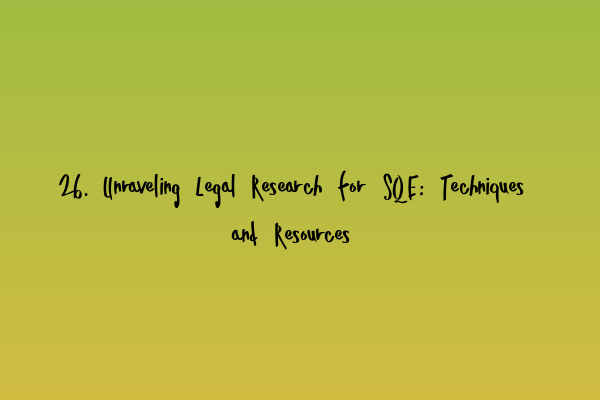Unraveling Legal Research for SQE: Techniques and Resources
Welcome to another informative blog post from SQE Exam Law! In today’s discussion, we will be delving into the world of legal research – a fundamental skill for any aspiring solicitor. As you prepare for the Solicitors Qualifying Examination (SQE), it is essential to develop proficiency in legal research techniques and familiarize yourself with the vast array of resources at your disposal.
Why is Legal Research Important for the SQE?
Legal research forms the backbone of a solicitor’s work. As a solicitor, you will be expected to provide accurate and up-to-date information to clients, draft persuasive legal arguments, and navigate complex legal landscapes. Therefore, mastering legal research is vital to your success in the SQE and your future career.
Techniques for Effective Legal Research in SQE
1. Understand the Question: Before undertaking any research, ensure that you fully comprehend the question being asked. Break it down into its key components and identify the legal issues involved. This will help you formulate a focused research strategy.
2. Utilize Primary Sources: Primary sources of law include legislation, case law, and international treaties. These sources carry significant weight and should be your starting point. Familiarize yourself with the relevant legislation and landmark cases related to the legal issue at hand.
3. Secondary Sources: Secondary sources, such as legal textbooks, law journals, and encyclopedias, provide commentary and analysis of legal principles. Use these resources to gain a deeper understanding of the topic and identify relevant case precedents and statutory provisions.
4. Online Databases: Online legal databases are treasure troves of legal information. Platforms like LexisNexis and Westlaw offer comprehensive access to statutes, case law, legal journals, and much more. Practice conducting searches using Boolean operators to refine your results.
5. Legislation Websites: Government websites and parliamentary databases often provide free access to legislation. Make use of these platforms to access statutes, statutory instruments, and explanatory notes. Ensure you are using the most recent versions of the legislation.
6. Case Law Websites: Many national and international courts maintain websites that provide public access to judgments. Websites like BAILII and the Supreme Court’s case database are valuable resources for finding recent case law and authoritative judicial decisions.
7. Law Libraries: Don’t overlook the power of physical law libraries. University libraries and public libraries often house extensive legal collections. Make use of their resources, including legal textbooks, law reports, and legal databases.
8. Professional Legal Organizations: Solicitors’ organizations and legal associations often provide access to research materials, seminar papers, and legal commentary. Become a member of these organizations and take advantage of their resources.
9. Stay Updated: While legal research involves looking back at established legal principles, it is crucial to stay abreast of recent developments. Subscribe to legal newsletters, follow leading legal blogs, and engage with authoritative legal commentators on social media to keep up with the latest legal trends.
Recommended Resources for SQE Legal Research
1. Mastering Time Management in SQE: Strategies for Efficient Exam Completion: Learn techniques to manage your time effectively during the SQE exam, allowing you to allocate sufficient time for legal research.
2. Conquer the Multiple Choice Questions (MCQ) in SQE1: Understand how legal research plays a significant role in answering multiple-choice questions in the SQE1 exam.
3. Mastering Effective Revision Techniques for SQE Success: Discover revision strategies that help you consolidate your legal research knowledge for the SQE exams.
4. Interactive mock tests for SQE: Enhancing engagement and learning: Practice your legal research skills using interactive mock tests specifically designed for the SQE, allowing you to sharpen your abilities and gain confidence.
5. SQE Sample Papers: Practice for Exam Success: Access sample papers that provide opportunities to apply your legal research skills within the SQE exam context.
In Conclusion
Legal research is a vital skill for solicitors, and mastering it is crucial to your success in the SQE and your future legal career. By employing effective research techniques, utilizing a range of resources, and staying updated with legal developments, you can develop a solid foundation in legal research. Incorporate these techniques into your study routine, practice regularly, and remember to consult the recommended resources to enhance your SQE exam preparation.
Good luck with your SQE journey!
